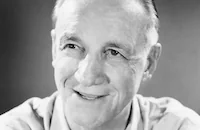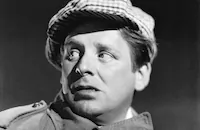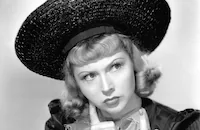Rendezvous with Annie
Cast & Crew
Allan Dwan
Eddie Albert
Faye Marlowe
Gail Patrick
Philip Reed
Sir C. Aubrey Smith
Film Details
Technical Specs

Synopsis
Jeffrey Dolan, a hapless young veteran, is being held in a New Jersey jail for attempted murder. When nightclub singer Dolores Starr visits him, Jeff relates the events that led to his imprisonment: As an Air Force clerk in London, Jeff shares a bomb shelter, and the details of his beloved wife Annie and her wonderful cakes, with a friendly British man he calls "The Old Duffer." When he receives a three-day pass, his pilot buddies, Captain Spence and Lieutenant Avery, talk him into going AWOL on their overnight flight to America so he can visit Annie on their anniversary. Along the way, Jeff is almost found out by General Trent, who rides with them unexpectedly. When they arrive, Spence and Avery take Jeff to the Bongo Club, where Avery's girl friend Dolores Starr sings. There, a nervous Jeff bumps into a hometown friend, Everett Thorndyke, who is with his mistress and insists that neither mention seeing the other. When he finally reaches Annie, they spend a romantic evening together, and though she leaves him with a cake and a promise not to tell anyone he has been home, he brings a piece back for The Old Duffer and tell the man he has been AWOL. Nine months later, the war ends and Jeff goes home, to find that Annie has just given birth to a son. At first, he is so overjoyed he does not notice that everyone in town is treating him strangely, but when lawyer Elmer Snodgrass tells him that he has one week to prove his son's paternity or the boy will lose his inheritance of half a million dollars, Jeff realizes that, since no one knows he visited Annie earlier, they do not believe the child is his. First, Jeff visits Thorndyke to try to make him admit that he saw Jeff at the Bongo Club, but Thorndyke, who is afraid of being caught with his mistress, denies it. Next, Jeff asks Spence and Avery to confirm that he was in New Jersey, but they resist for fear of being court-martialed. When they change their minds and offer to vouch for him, Jeff cannot let them ruin their careers and so tries to court-martial himself instead. When he goes to General Trent to do this, however, the general does not remember Jeff, and instead throws him out. Jeff then remembers a photograph taken of him at the Bongo Club, and visits Dolores, who takes him to find Louise Grapa, the photographer. Jeff is not in the photograph, and Dolores' jealous husband, Phil Denim, attacks Jeff, prompting Jeff to knock him out. Dolores, relieved, kisses Jeff on the cheek, and when Louise snaps a photo, unscrupulous newspaperman Al Morgan prints it in the paper. The next day, Annie sees the photo and accuses Jeff of cheating on her. At that moment, Jeff sees an article about The Old Duffer, who is actually Sir Archibald Clyde, visiting from London. He runs to see the old man, who can corroborate his story, but when he gets there, he sees Morgan and attacks him. Clyde's suspicious guards arrest Jeff for attempting to murder Clyde. After Dolores has heard this story, she agrees to help Jeff, and the next day he is set free. Dolores has brought Clyde, Snodgrass and Avery to his house to prove Jeff's story. Town editor Mr. Kramer also drags Thorndyke in and then agrees to print the story of Jeff's paternity, and Jeff's son gains his rights as an heir.

Director

Allan Dwan
Cast

Eddie Albert
Faye Marlowe

Gail Patrick

Philip Reed

Sir C. Aubrey Smith

Raymond Walburn

William Frawley

James Millican

Wallace Ford

Will Wright

Lucien Littlefield
Edwin Rand
Mary Field
Richard Sale
Bob Foy

Joyce Compton
George Chandler

James Flavin
Thomas P. Dillon
Leon Lenoir
Houseley Stevenson
Mary Currier

James Kirkwood

Jeff Corey
Harry Depp

Lillian Bronson
Josephine Whittell
Janet Warren
Harlan Briggs
Tristram Coffin
Eddie Dunn
Eddy Waller
Harry Strang

Paul Maxey
John Berkes
Pat Flaherty
George Turner
Mike Kilian
Gene Garrick

Bob Wilke
Mike Frankovich
Ralph Peters
Beatrice Gray
Mary Newton
Milton Parsons
Willa Pearl Curtis
Florence Pepper
Freddie Chapman

Billy Gray
Edgar Caldwell
Burton Jones
Joe Hartman
Rudolfo Silva
Major Sam Harris
David Reed
Ned Roberts
John R. Hoover
Crew
Hilyard Brown
Thomas A. Carman
Joseph Dubin
Allan Dwan
Fanchon
Cy Feuer
Mike Frankovich
Peggy Gray
Johnny Grubbs
Herbert Kirkpatrick
Reggie Lanning
Mary Loos
Howard Lydecker
Theodore Lydecker
Bob Mark
John Mccarthy Jr.
George Milo
Adele Palmer
Lewis Physioc
Arthur Roberts
Richard Sale
Gordon Schaefer
John Stransky Jr.
Richard Tyler
Howard Wilson
Howard Wilson

Film Details
Technical Specs

Articles
Eddie Albert (1906-2005)
The son of a real estate agent, Albert was born Edward Albert Heimberger in Rock Island, Ill., on April 22, 1906. His family relocated to Minneapolis when he was still an infant. Long entralled by theatre, he studied drama at the University of Minnesota. After years of developing his acting chops in touring companies, summer stock and a stint with a Mexican circus, he signed a contract with Warner Bros. and made his film debut in Brother Rat (1938). Although hardly a stellar early film career, he made some pleasant B-pictures, playing slap happy youths in Brother Rat and a Baby (1940), and The Wagons Roll at Night (1941).
His career was interrupted for military service for World War II, and after his stint (1942-45), he came back and developed a stronger, more mature screen image: Smash-Up: The Story of a Woman (1947); Carrie (1952); his Oscar® nominated turn as the Bohemian photographer friend of Gregory Peck in Roman Holiday (1953); a charming Ali Hakim in Oklahoma (1955); and to many critics, his finest hour as an actor, when he was cast unnervingly against type as a cowardly military officer whose lack of commitment to his troops results in their deaths in Attack! (1956).
As he settled into middle-age, Albert discovered belated fame when he made the move to Hooterville. For six seasons (1965-71), television viewers loved Eddie Albert as Oliver Wendal Douglas, the bemused city slicker who, along with his charming wife Lisa (Eva Gabor), takes a chance on buying a farm in the country and dealing with all the strange characters that come along their way. Of course, I'm talking about Green Acres. If he did nothing else, Alberts proved he could be a stalwart straight man in the most inane situations, and pull it off with grace.
After the run of Green Acres, Albert found two of his best roles in the late stages of his career that once again cast him against his genial, good-natured persona: the fiercly overprotective father of Cybill Shepherd in The Heartbreak Kid (1972), for which he earned his second Oscar® nomination; and the sadistic warden in Robert Aldrich's raucous gridiron comedy The Longest Yard (1974). Soon, Albert was in demand again, and he had another hit series, playing a retired police officer who partners with a retired con artist (Robert Wagner) to form a detective agency in Switch (1975-78).
The good roles slowed down slightly by the dawn of the '80s, both film: The Concorde: Airport '79 (1979), How to Beat the High Co$t of Living (1980), Take This Job and Shove It (1981); and television: Highway to Heaven, Murder, She Wrote, Thirtysomething, offered him little in the way of expansion. Yet, Albert spent his golden years in a most admirable fashion, he became something of activist for world health and pollution issues throughout the latter stages of his life. It is widely acknowledged that International Earth Day (April 22) is honored on his birthday for his tireless work on environemental matters. Albert was married to famed hispanic actress Margo (1945-85) until her death, and is survived by his son, actor Edward Albert, a daughter, and two granddaughters.
by Michael T. Toole

Eddie Albert (1906-2005)
Quotes
Trivia
Notes
Rendezvous with Annie was director Allan Dwan's first film for Republic. Faye Marlowe was borrowed from Twentieth Century-Fox for this film. Although the official billing sheet lists music by Nathan G. Scott, the screen credits credit Joseph Dubin; the extent of Scott's contribution to the final film has not been confirmed. Hollywood Reporter news items note that some scenes were shot on location at the Long Beach Army Airfield and at the Metropolitan Airport in Van Nuys. In 1953, this film was re-edited and released under the name Corporal Dolan Goes AWOL.














